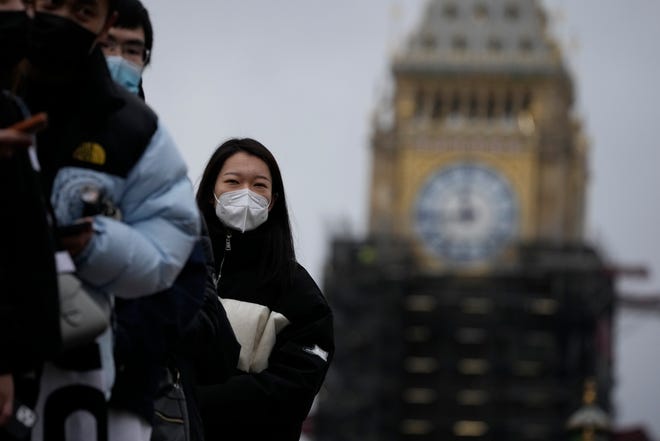
- The new study from South Africa's largest private health insurer shows that two shots of the Pfizer-BioNTech vaccine is just 33% protective against omicron.
- Full vaccination against COVID-19 continues to provide 70% protection against severe disease, according to the Discovery Health study.
- Omicron also appears to be able to reinfect people who had an earlier disease variant, with those infected longer ago at higher risk of reinfection.
The new omicron variant is substantially more contagious and reduces the effectiveness of COVID-19 vaccines, but people who are fully vaccinated are still largely protected against severe disease, according to a study from South Africa released Tuesday.
The variant, which is believed to have emerged this fall in southern Africa, looks poised to take over the world, as delta did before it. Omicron accounts for 90% of COVID-19 cases in South Africa and is a growing problem in Europe. It has been seen in at least 30 U.S. states, though the delta variant still dominates the American outbreak.
Formally identified only the day before Thanksgiving, information on omicron's characteristics – including how contagious and dangerous it may be – are just emerging.
The new study from Discovery Health, South Africa's largest private health insurer, shows that two shots of the Pfizer-BioNTech vaccine, which provided over 90% protection against infection with the original version of the virus is only 33% protective against anyomicron infection.
Full vaccination continues to provide 70% protection against severe disease, which seemed to hold up across high-risk groups, though it declined somewhat in people over 60 and even more in those over 70.
"This is the first time we've had any data on that," said Dr. Eric Topol, vice president for research at Scripps Research in La Jolla, California, and a national expert on the use of data in medical research.
"Seventy percent is definitely a dropdown. It isn't great," he said. "It was 95% effective severe disease when it was delta variant and then about 85% after six months of waning," he said.
Whether those numbers will continue to hold as more patients with omicron are studied isn't yet clear, he said. "This is all still so new."

Other research from Pfizer-BioNTech suggests that a third, booster dose can restore the original levels of protection at least for some period of time.
“The Omicron-driven fourth (wave) has a significantly steeper trajectory of new infections relative to prior waves," Dr, Ryan Noach, CEO of Discovery Health, said in a statement. "National data show an exponential increase in both new infections and test positivity rates during the first three weeks of this wave, indicating a highly transmissible variant with rapid community spread of infection.”
The omicron variant is fueling misinformation about COVID: Experts explain why and how to spot false claims.
Omicron also appears to be able to reinfect people who had an earlier disease variant. Those infected longer ago with earlier variants are at higher risk of reinfection. People infected in South Africa's first wave early last year, have a 73% chance of reinfection, while those infected with the beta variant have a 60% chance of reinfection and those infected in its most recent delta wave face a 40% risk of reinfection with omicron, the new study showed.
That fits with findings from a preliminary briefing released by the United Kingdom on Friday showing an approximately three- to eight-fold increased risk of reinfection with the omicron variant, Topol said.
There has been some hope that omicron would cause fewer cases of severe disease than its predecessors, but that remains unclear.
The rate of hospital and intensive care unit admissions is lower than with other variants – 29% lower than with the first wave of infections early last year, according to the study. But that may be because so many South Africans recently recovered from infections with delta, Noach said.

Children continue to show a relatively low rate of infection with omicron, as they have with earlier variants, the study showed.
Children infected with omicron have so far had a 20% higher risk of hospital admission for complications than they did with earlier variants, according to Shirley Collie, chief health analytics actuary at Discovery Health.
“This is early data and requires careful follow up," Collie said in a company press release. But the finding lines up with an earlier warning from South Africa’s National Institute for Communicable Diseases of an increase in hospital admissions for children under 5.
OMICRON IS HERE:How to manage your anxiety about the new variant
Anecdotal reports from South African hospitals suggest that most young children hospitalized with COVID-19 tested positive on routine screening, after going to the hospital for an unrelated reason.
"It's a peculiarity that hasn't been explained," Topol said of the high rate of hospital admissions for children. "It hasn't yet been seen in the United Kingdom, Denmark, Norway and other places hard hit by omicron."
“Children were 51% less likely to test positive for COVID19 relative to adults in the Omicron period, and overall, the risk of children being admitted to hospital for COVID19 complications remains low” Collie said.
The Discovery Health study, in collaboration with the South African Medical Research Council, included more than 211,000 positive COVID-19 test results, 41% from adults who had received two-doses of the Pfizer-BioNTech vaccine. Approximately 78,000 of these positive COVID-19 test results, identified between Nov. 15 and Dec. 7, were attributed to omicron infections.
Contact Karen Weintraub at [email protected].
Health and patient safety coverage at USA TODAY is made possible in part by a grant from the Masimo Foundation for Ethics, Innovation and Competition in Healthcare. The Masimo Foundation does not provide editorial input.
Source link









